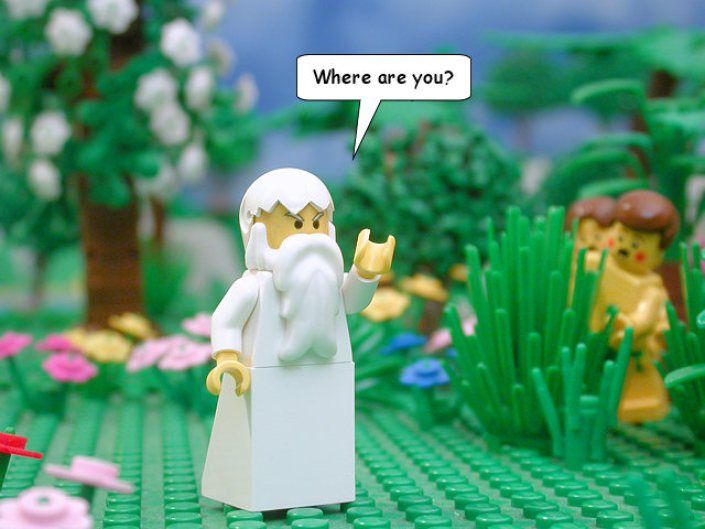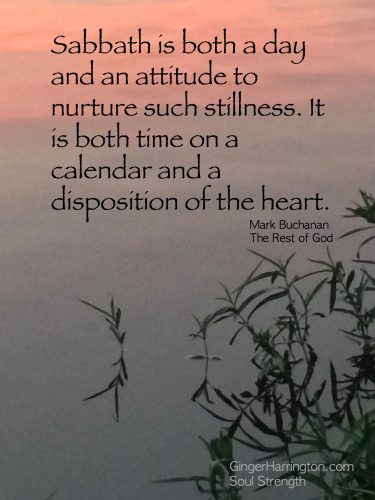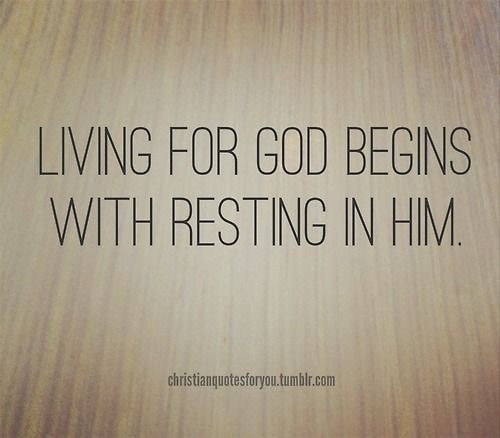|
There’s this game that new parents like to play with their toddler, and it is nothing less than ridiculous. I’m sure you’ve seen it or done it yourself – walk into a room and pretend you can’t see the young child sitting in plain sight. Each time mom asks, “Where’s my baby?” an uncontrollable fit of giggles ensues. Later, children take this game to their friends; only now it’s a bit more refined. One child will seek, and the others will quickly scatter to find the perfect hiding place. As the seeker counts down, the others try their best not to giggle or squirm…and blow their cover. For what often seems like eternity to those hiding, the seeker finally yells, “Ready or not, here I come!” and her mission begins. Looking behind trees and bushes the seeker calls out, “Where are you?” Those who are bold enough abandon their hiding place will make a mad-dash to home base trying not to get caught. This timeless game seems to have gotten it origins in the third chapter of Genesis. It’s by far one of the most famous, well-know tales. By the time we get to our reading today, the serpent has already tricked Adam and Eve into disobeying God’s command to not eat the fruit of this one particular tree.
In Judeo-Christianity all the brokenness of the world can point their finger at this “original sin,” as it’s often called. What happened in the Garden of Eden is considered to be the cause of our falling away from God. As such, Jesus becomes the antidote that redeems us back to God. It doesn’t seem fair that one single action would make us all suffer and risk losing God’s love. As songwriter David Bazan sings, “Wait just a minute, you expect me to believe, that all this misbehaving, came from one enchanted tree?” Perhaps there’s more to this story than living with all the guilt and shame handed down by some ancient man and woman. Just as any question requires an answer to be complete, when God asks, “Where are you?” we must ask ourselves: “How will I answer?” Perhaps then this story is more about humble faith than it is about human failure. We all have to make a conscious choice: to be faithful to God or faithful to one’s self. In theological terms, we are given “free will” which says we can choose God and thrive in the heavenly garden of life. Or we can to hide and toil through a hell of our own making. The choice is ours. Or is it? Old Testament scholar Walter Brueggemann jokes, “The serpent is our first theologian, who convinces humankind to trade obedience to God’s Word for a theology about God.” Instead of choosing to live faithfully and fully with our Creator, most humans and, let’s face it, most religions, prefer to play the creator, shaping God in our image so that we can live the way that suits our wants and needs. At the beginning of Genesis 3, the serpent is described as the “most crafty of all the animals created by God.” What does that say about free will if our creator also created our temptation? In ancient Near East culture, the serpent was often venerated as a god of fertility (beginning of life), and a god of immortality (everlasting life). Like we see in Genesis, the serpent was also regarded as wisdom. Freud called it ego. So here we have wisdom (ego) slithering into life (Eve) to convince humans (Adam) that we possess all the knowledge we need to be gods. The serpent invites us to cut out the middleman. With God out of the way, you can take control of your own life; do what you want, whenever you want. But it begs another question: who can save us when our ego’s clash…or worse, when they come crashing down? Today, with Humanism on the rise and more people identifying as having no religious affiliation, this serpent is thriving. (One needs to look no further than our own political leaders to see enmity between us and snakes.) Our ego has created a consumer driven culture that worships greed and believes materialism is heavenly and divine. But most people struggle to keep up. They find such belief leads to an endless hell – being consumed by the fires of debt, inequality, poverty and war. Religious organizations are not without guilt – shaping God as they see fit. They claim exclusive rights on God, and push out those who do not agree with them. This is “the lowest level of human consciousness,” writes Richard Rohr. “Religion that doesn’t transform your consciousness to one of compassion” does not lead us to a higher state of peace, or nirvana, or heaven itself. But it does make a great hell for those marginalized and pushed away. The choice is ours. The big story of the Bible is that Jesus came to reclaim us, all of us. And to refocus our attention on the One who made us in the divine image of God. Jesus did not come to start a religion. Nor did he ever say worship. Instead Jesus walked faithfully with God, rejecting his own ego for our sake. To follow him means to imitate his actions; to choose God instead of our own messed up, broken down self. I’ll admit when left to my own devices I tend to fall hard. I beg to hear God ask, “Where are you?” so I no longer have to hide from my actions, or stuff my shame down any further. There’s something freeing about leaving your hiding place to run home. Only then can God tag you and say, “I got you.” Eventually we all come to that place where the world no longer offers what our heart truly desires. Instead of joy and peace, you feel lost, abandoned, and emptied. You wake up realizing you no longer have what it takes to keep going. (Celebrities Kate Spade/Anthony Bourdain let their egos convince them that their disease was hopelessness.) You begin to recognize that the fruits of your own creation no longer satisfy you. And you are done hiding. You’re done holding onto the shame and guilt. No matter what the world or your own ego might tell you, you are never without hope. Jesus came and showed us the way home to God’s love and grace. We can choose to follow him home or stay where we are. Is there something going on in you that’s causing you to hide from God? Is there something you’re ashamed of or some guilt you’re still burdened by? Maybe you believe all the stuff you’ve done, or what has been done to you, is somehow unforgivable. It seems wisdom and ego cannot save you from these feelings. When God calls to the man and woman hiding, Adam not only gives up their hiding place but he also admits their guilt. He say’s to God here I am. And this is what I’ve done. Even though he passes the blame on to God, he still remains accountable to his action. While the couple is reprimanded, the serpent is the one that is cursed. This story is not about how we’ve messed up, but how we are forgiven, and loved. God is not walking around our gardens trying to catch us so we might be condemned.God is walking into our lives, asking us where we are, because God wants to be with us, play with us, and give us what our heart truly desires. God wants to love us unconditionally, even if our ego tries to convince us otherwise. God asks the question again and again, “Where are you?” How you will answer is up to you. Work Cited: Bartlett, David L. , Barbara Brown Taylor. Feasting on the Word: Year B, Vol. 3. Louisville: Westminster John Knox, 2009. Bazan, David. "Hard To Be." Curse Your Branches. 2009. Bruggemann, Walter. Genesis. Atlanta: John Knox Press, 1982, pp.47-48. Jolly, Marshal. episcopaldigitalnetwork. June 2018. http://episcopaldigitalnetwork.com/stw/2018/05/07/where-are-you-pentecost-3b-june-10-2018/ (accessed June 8, 2018). Rohr, Richard. Immortal Diamond. San Francisco: Jossey-Bass, 2013.
0 Comments
Sabbath is a gift from God that allows |
|||||||||||||||||||||||||
| The Bible gives us a ton of examples of Jesus using small, ordinary moments – like walking and plucking grain – to reclaim and redeem God’s Kingdom. It’s in these small moments Jesus reclaims and redeems us. In a culture that applauds and idolizes busyness, we ought not overlook or forget that Jesus identifies himself as the Lord of the Sabbath —the Lord of Rest! In Matthew’s gospel Jesus says, “Come to me, all of you who labor and are burdened, and I will give you rest.” One of the great blessings of the gospel is that Jesus invites you into God’s shalom, where you find the peace and rest from the busyness of life. More than a recharge of your battery, it’s a way to nourish your spirit so you can flourish in God’s love and grace. | The sabbath was made for humankind, and not humankind for the sabbath; so the Son of Man is lord even of the sabbath. |
From meeting with people, having honest conversations, putting in long hours at work, sitting in traffic, grocery shopping, volunteering at your kid’s school, or taking a moment to enjoy sheer inactivity - every aspect of our life has a purpose in God’s kingdom.
For it’s in these moments we find Jesus standing in our midst, holding up a mirror for us to look in, and reminding us how to fulfill the will of God with a joyful heart, and not merely observe it or check it off our to-do list.
Work Cited:
Bartlett, David L and Barbara Brown Taylor, Feasting on the Word, Year B Vol. 4. (Westminster John Knox: 2007).
Keller, Tim. http://qideas.org/articles/wisdom-and-sabbath-rest. (2015) June 1, 2018.
| study_guide_2018.06.03.pdf | |
| File Size: | 64 kb |
| File Type: | |
Rev. Ian
has been blogging under the name: Jesus not Jesús: Looking for Christ in the face of strangers. You can read his posts and browse his archives by clicking here.
Sermon Archives
November 2021
October 2021
September 2021
August 2021
July 2021
June 2021
May 2021
April 2021
March 2021
February 2021
January 2021
December 2020
November 2020
October 2020
September 2020
August 2020
July 2020
June 2020
May 2020
April 2020
March 2020
February 2020
January 2020
December 2019
November 2019
October 2019
September 2019
August 2019
July 2019
June 2019
May 2019
April 2019
March 2019
February 2019
January 2019
December 2018
November 2018
October 2018
September 2018
August 2018
July 2018
June 2018
May 2018
April 2018
March 2018
February 2018
January 2018
December 2017
November 2017
October 2017
September 2017
August 2017
July 2017
June 2017
May 2017
April 2017
Sunday at 11:00 a.m.



 RSS Feed
RSS Feed

